- Home
- Anne McCaffrey
Dragons Dawn Page 5
Dragons Dawn Read online
Page 5
Jiro nodded. As Kenjo watched, hand hovering over the retros in case the landing gear failed to emerge, the green lights came on unwinkingly, and then he felt the pull of air against the great wheels as they locked into position. The shuttle’s speed was a shade too high for landing. The vast field was coming up under them, a field that undulated like the sea. Kenjo fought down the panic. He checked the drag, windspeed, and, wincing at the necessity, fired the retros again briefly and pulled the nose up as he persuaded the shuttle to settle to the surface of Pern.
Once the big wheels touched, the shuttle bounced a bit over the uneven ground. Braking judiciously and making full use of his flaps Kenjo swung the shuttle in a wide circle so that it faced the way it had just come and rolled to a complete stop.
Kenjo permitted himself a small smile of satisfaction, then returned his attention to the control panel, to begin the landing checklist. Noting the fuel expended, he gave a grunt of pleasure at his economy. Liters under the allowance.
“Fine landing, Kenjo! Jiro! My compliments,” the admiral exclaimed. Kenjo decided that he would forgive him that enthusiastic clout on the shoulder. Then suddenly he and Jiro were startled by unexpected sounds: the snapping of metal clasps, and the sudden noise of air rapidly evacuating.
Alarmed, Kenjo turned just in time to see the admiral and the Governor disappearing down the cabin’s escape hatch. Kenjo glanced frantically at his console, certain that the expedition’s leaders must be reacting to an emergency of some sort, but only the red brake light was on. Smells of burning grass and oil and rocket fuel wafted up to the two pilots through the open hatch. Simultaneously they were aware of the shouts from the passenger cabin – shouts of joy, not cries of panic. A glance in the screens proved to Kenjo that their passengers were releasing their safety harnesses. A few had risen and were tentatively stretching legs and arms, talking excitedly in anticipation of stepping out on the surface of their new home. But why had the admiral and the governor left the shuttle so precipitously – and through the escape hatch instead of the main exit?
Jiro eyed him questioningly. All Kenjo could think to do was shrug. Then, as the cheering subsided into a silence punctuated by nervous whispers, Kenjo realized that, as pilot, it fell to him to take charge. He activated the cargo-hold release mechanism, then switched the sensors to exterior, setting the cameras to record the historic moment. Above all, he must pretend that everything was in order, despite the strange behavior of the admiral and the governor.
Kenjo unstrapped himself, motioning for Jiro to do the same. He stooped, briefly, to activate the hatch closure. Then he took the three steps to the panel between the two cabins and palmed it open.
Cheers greeted him and, modestly, he dropped his head and eyes. The cheers subsided expectantly as he reached the rear of the payload cabin and undogged the passenger hatch. With an unnecessary but satisfying force, he pushed open the door. As the aperture opened and the ramp extended, the fresh air of the new world poured in. He was not the only one to take a deep breath of the oxygen-rich, aromatic air. Kenjo was debating with himself the protocol of such an occasion, since the logical candidates had already evacuated the vehicle, but Jiro, beside him, began to point excitedly. Kenjo peered around the slowly opening hatch and blinked in astonishment.
There, visible not only to him but to the other five shuttles which had landed in due order behind him, were two brilliant banners. One was the gold and blue of the Federated Sentient Planets. The other was the brand-new standard for the planet Pern: blue, white, and yellow, with the design of sickle and plow in the upper left-hand corner, signifying the pastoral nature of the colony. Occasionally hidden by the flapping of the banners in the steady breeze over the meadow were the triumphant figures of Admiral Benden and Governor Boll. The pair of them were grinning like idiots, Kenjo saw, as they enthusiastically beckoned the passengers to emerge.
“Let us welcome you, my friends, to the planet Pern,” the admiral cried in a stentorian voice.
“Welcome to Pern!” the governor shouted. “Welcome! Welcome!”
They looked at each other and then began the formal words in an obviously well rehearsed unison.
“By the power vested in us by the Federated Sentient Planets, we hereby claim this planet and name it Pern!”
* * * * *
The engineers, the power-resource group, the jacks-of-all-trades, and every able-bodied man and woman who knew which end of a hammer to grip were set to work putting down the landing-strip grids. A second work force erected the prefabricated sections of the landing control and meteorology tower, in which Ongola and the other meteorologists would be based.
The tower was three stories high, two square sections supported by a wider and longer rectangular base. Initially the ground level would serve as headquarters for the admiral, the governor, and the informal council. When the proper administrative square had been built later on, the entire installation would be turned over to meteorology and communications.
The third and smallest group – all eight of Mar Dook’s agronomists, plus a dozen able-bodies, Pol Nietro from zoology, Phas Radamanth and A. C. Sopers of xenobiology and Ted Tubberman and his crew – had the task of choosing the site for the experimental farm. Others were detailed to scout for varieties of vegetation that might be efficiently converted into various plastics which the colony would need for building. On the one minisled brought along, Emily Boll flew between the agronomy survey and the control tower, correlating data. Once the emergency infirmary was set up, medics were kept busy patching bruises and scrapes, and peremptorily ordering rest periods for the older workers who were overextending themselves in enthusiasm.
By midday, those in orbit had a nonstop show of the disciplined but constant activities on the surface.
“It keeps people home,” Sallah remarked to Barr Hamil, her copilot, as they traversed nearly empty corridors on their way back from the main hangar where they had been checking cargo manifests for their first trip down.
“It’s fascinating, Sal. And we’ll be there tomorrow!” Barr’s eye’s were shining, and she wore a silly grin. “I really can’t believe we’re here, and will be there!” She pointed downward. “It’s like a dream. I keep being afraid I’ll wake up suddenly.”
They had reached their own quarters and both had eyes only for the vid screen in the corner.
“Good,” Barr said with a relieved sigh. “They’ve got the donks assembled.”
Sallah chuckled. “Our job is to get the shuttle down in one piece, Barr. Unloading is someone else’s problem.” But she, too, was relieved to see the sturdy load handlers lined up at the end of the almost completed landing strip. The donks would greatly facilitate unloading, and speed up the shuttles’ return to their mother ships for the next run. Already there were informal competitions between the various units to bring their projects in faster and more efficiently than programmed time allowed.
Sallah and Barr watched, as everyone did, until the dark tropical moonless night rendered the broadcasts impossible to interpret. Broadcasts from the surface would be primitive until Drake Bonneau and Xi Chi Yuen, in the admiral’s gig, had a chance to install the commsats on the two moons. Nonetheless, the last scene raised a nostalgic lump in Sallah’s throat, reminding her of the hunting trips that she and her parents had enjoyed in the hills around First on Centauri.
The screen showed tired men and women seated around an immense campfire, eating an evening meal that had been prepared in a huge kettle from freeze-dried Terran vegetables and meats. In the failing light, the white strips of the runway grids and the wind sock having convulsions in the brisk breeze, were just barely visible. The planetary flag, so proudly displayed that morning, had wrapped itself around the pole above the control tower. Someone began to play softly on a harmonica, an old, old tune so familiar that Sallah couldn’t name it. Someone else joined in with a recorder. Softly and hesitantly at first, then with more confidence, the tired colonists began to sing or hum along. Other vo
ices added harmony, and Sallah remembered that the song was called “Home on the Range.” There certainly had been no “discouraging words” that day. And the evening serenade did make the landing site seem a bit more like a home.
The next morning Sallah and Barr had been up long before the klaxon sounded, assembling their passengers and making last-minute weight calculations. The pilots had been given a very serious briefing from Lieutenant Commander Ongola on the necessity of conserving of fuel.
We have just enough liquid fuel to get every man, woman and child, beast, parcel, package, and reusable section of the ships down to the surface. Waste not, want not. Fools waste fuel! We have none to waste. Nor,” he added, with his sad wistful smile, “fools among us.”
Watching on the loading-bay screens, Sallah and Barr could follow the six shuttles lifting from the planet’s surface. Then the scene shifted to a panoramic view of the main landing site.
It’s breathtaking, Sal, breathtaking,” Barr said. “I’ve never seen so much unoccupied, unused land at one time in my life.”
“Get used to it,’’ Sallah replied with a grin.
With the activities of the landing party to watch, it seemed like no time at all before the shuttles were locking on. The loading detail were trundling the first crates into the hold before Kenjo and Jiro could exit. Sallah was a little annoyed with Kenjo for his brusque dismissal of Barr’s excited questions. Even Jiro looked abashed by his senior’s truculence as Kenjo succinctly briefed Sallah on landing procedures, advice on handling the shuttle’s idiosyncrasies, and the frequency for the tower meteorological control. He wished her a safe drop, saluted, and, turning on his heel, left the bay.
“Well, hail and farewell,” Barr said, recovering from the snub.
“Let’s do the preflight even if Fussy Fusi has made such a big deal of turnover,” Sallah said, sliding into the lock of the Eujisan an inch ahead of the next big crate being loaded. They had finished their check by the time loading was complete. Barr did passenger inspection, making very certain that General Cherry Duff, the oldest charterer and the pro tem colony magistrate, was comfortable, and then they were cleared for the drop.
“We were barely there,” Barr complained as Sallah taxied the Eujisan into takeoff position at the end of the runway eight hours later. “And now we’re away again.”
“Efficiency is our guide. Waste not, want not,” Sallah told her, eyes on the instrumentation as she opened the throttle on the Eujisan for lift-off thrust. She grimaced, eyes flicking between fuel gauge and rev counter, not wanting to use a cc more of fuel than necessary. “Kenjo and the next eager set of colonists will be chewing hunks out of the cargo hatch. We must up, up, and away!”
“Kenjo never made an error in his life?” Barr asked of Sallah sometime later after the famous pilot had made a disparaging remark about the shuttle’s consumption of fuel during the trips made by the two women.
“That’s why he’s alive today,” Sallah replied. But his comment rankled. Though she knew that she had expended no more fuel than was absolutely necessary, she began keeping a private record of consumption on each of her trips. She noticed that Kenjo generally oversaw the Eujisan’s refueling and supervised its fifty-hour checks. She knew that she was a better than average pilot, in space or atmospheric craft, but she did not want to make waves with a hero pilot who had far more experience than she did – not unless she absolutely had to, and not without the ammunition of accurate records.
Patterns were quickly established. Those on the ground began each morning by erecting the housing and work areas for those due to arrive during the day. The agronomy teams handily cleared the designated fields. The infirmary had already dealt with its first clients fortunately, all the accidents so far had been minor. And despite all the hard work, senses of humor prevailed. Some wit had put up street signs with estimated distances in light-years for Earth, First Centauri and The homeworlds of the other members of the Federated Sentient Planets.
Like everyone else waiting to drop, Sorka Hanrahan spent a lot of time watching the progress of the settlement, which had been informally dubbed “Landing.” To Sorka, watching was only a way to pass the time. She was not really interested, especially after her mother kept remarking that they were seeing history made. History was something one read about in books. Sorka had always been an active child, so the enforced idleness and the constriction of shipboard life quickly became frustrating. It was small comfort to know how important her father’s profession of veterinary surgeon was going to be on Pern when all the kids she had met in the mess halls and corridors were getting down to Pern faster than she and her brother were.
Brian however, was in no hurry. He had made friends with the Jepson twins, two aisles away. They had an older brother Sorka’s age, but she did not like him. Her mother kept telling her that there would be girls her age on Pern whom she would meet once she got to school.
“I need a friend now,” Sorka murmured to herself as she wandered through the corridors of the ship. Such freedom was a rare privilege for a girl who had always had to be on guard against strangers. Even home on the farm in Clonmel, she had not been allowed out of sight of an adult, even with old Chip’s protective canine presence. On the Yokohama, not only did she not have to watch out, but the whole ship was open to her, provided she kept out of engineering or bridge territory and didn’t interfere with crew. But at that moment she did not feel like exploring; she wanted comfort. So she headed for her favorite place, the garden.
On her first long excursion, she had discovered the section of the ship where great broad-leafed plants arched over the ceiling, their branches intertwining to make green caves below. She loved the marvelous aroma of moist earth and green things, and felt no inhibition about taking deep lungfuls of air that left a clean, fresh taste at the back of her mouth. Beneath the giant bushes were all sorts, of herbs and smaller plants with tags on them, soon to be transported to the new world. She did not recognize most of the names, but she knew some of the herbs by their common names. Back at home her mother had kept an herb garden. Sorka knew which ones would leave their fragrances on her fingers and she daringly fingered the marjoram, then the tiny thyme leaves. Her eyes drank in the blues and pale yellows and pinks of the flowers that were in bloom, and she gazed curiously at the hundreds of racks of shoots in little tubes of water – nutrient fluids, her dad had told her – sprouted only a few months back, to be ready for planting once they reached Pern.
She had just bent to gently feel the surface of an unfamiliar hairy sort of silver-green leaf – she thought it had a nice smell – when she saw a pair of very blue eyes that no plant had ever sprouted. She swallowed, reminding herself that there were no strangers on the ship; she was safe. The eyes could belong only to another passenger, who, like herself, was investigating the peaceful garden.
“Hello,” she said in a tone between surprise and cordiality.
The blue eyes blinked. “Go ‘way. You don’t belong here,” a young male voice growled at her.
“Why not? This is open to anyone, so long as you don’t damage the plants. And you really shouldn’t be crouched down in there like that.
“Go ‘way.” A grubby hand emphasized the order.
“I don’t have to. Who’re you?”
Her eyes, adjusted to the shadows, clearly read the boy’s resentful expression. She hunkered down, looking in at him. “What’s your name?’’ she asked.
“I doan gotta tell nobody my name.” He spoke with a familiar accent.
“Well, excuse me, I’m sure,” she said in an affected tone. Then she realized that she recognized his accent. “Hey, you’re Irish. Like me.”
“I’m not like you.”
“Well, deny you’re Irish.” When he didn’t – because he couldn’t and they both knew it – she cocked her head at him, smiling agreeably. “I can see why you’d hide in here. It’s quiet and it smells so fresh. Almost like home. I don’t like the ship either; I feel – ” Sorka hugged hersel
f “ – sort of cramped and squashed all the time.” She lengthened the words to make them express her feelings. “I come from Clonmel. Ever been there?”
“Sure.” The boy’s tone was scornful, but he brushed a strand of long orange hair from his eyes and shifted his position so that he could keep his eyes on her.
“I’m Sorka Hanrahan.” She looked inquiringly at him.
“Sean Connell,” he admitted truculently after considerable delay.
“My dad’s a vet. The best in Clonmel.”
Sean’s expression cleared with approval. “He works with horses?”
She nodded. “With any sick animal. Did you have horses?”
“While we was still in Ballinasloe.” His expression clouded with resentful grief “We had good horses,” he added with defensive pride.
“Did you have your own pony?”
The boy’s eyes blinked, and he dropped his head.
“I miss my pony, too,” Sorka said compassionately. “But I’m to get one on Pern, and my dad said that they’d put special ones in the banks for you.” She wasn’t at all sure of that, but it seemed the proper thing to say.
“We’d better. We was promised. We can’t get anywhere ‘thout horses ‘cause this place isn’t to have hovervans er nothing.”
“And no more gardai.” Sorka grinned mischievously at him. She had just figured out that he must be one of the traveling folk. Her father had mentioned that there were some among the colonists. “And no more farmers chasing you out of their fields, and no more move-on-in-twenty-four-hours, or lousy halts, and no roads but the ones you make yourself, and – oh, just lots of things you really want, and none of the bad things.”
“Can’t be all that good,” Sean remarked cynically.
Suddenly the comm unit in the garden erupted into sound. “The boarding call has been issued for the morning drop. Passengers will assemble immediately in the loading bay on Deck Five.”

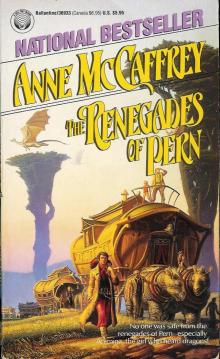 The Renegades of Pern (dragon riders of pern)
The Renegades of Pern (dragon riders of pern)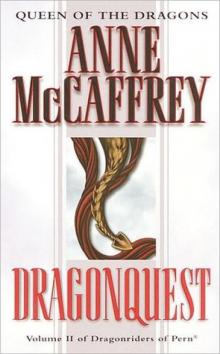 Dragonquest
Dragonquest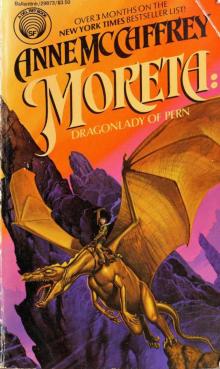 Moreta (Dragonlady of Pern)
Moreta (Dragonlady of Pern)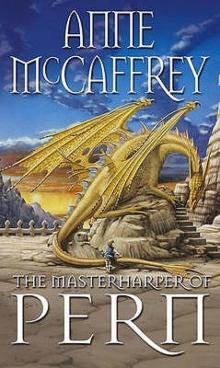 The Masterharper of Pern
The Masterharper of Pern If Wishes Were Horses
If Wishes Were Horses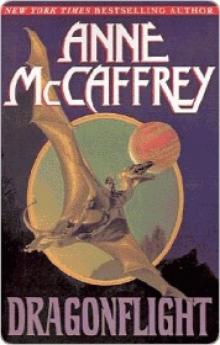 Dragonflight
Dragonflight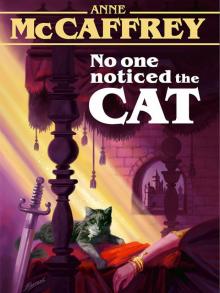 No One Noticed the Cat
No One Noticed the Cat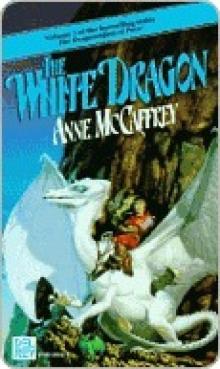 The White Dragon
The White Dragon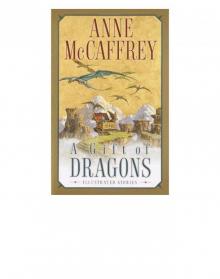 A Gift of Dragons
A Gift of Dragons Harper Hall - Dragonsong
Harper Hall - Dragonsong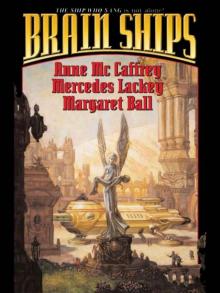 Brain Ships
Brain Ships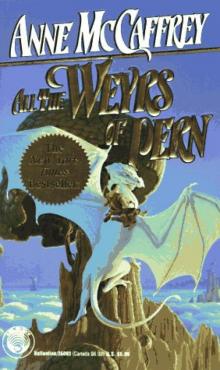 All The Weyrs of Pern
All The Weyrs of Pern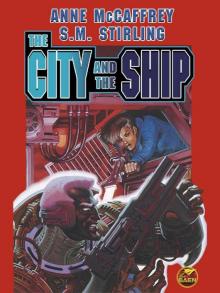 The City and the Ship
The City and the Ship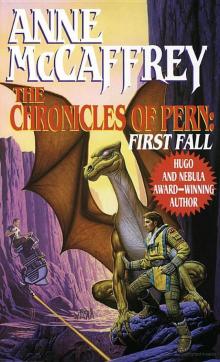 The Chronicles of Pern: First Fall
The Chronicles of Pern: First Fall Acorna’s Search
Acorna’s Search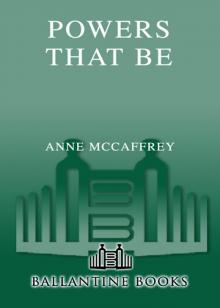 Powers That Be
Powers That Be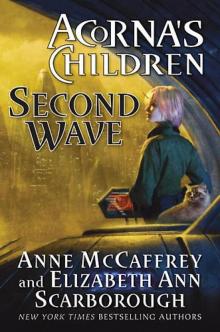 Second Wave
Second Wave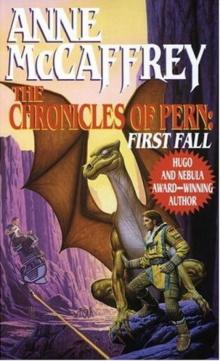 Chronicles of Pern (First Fall)
Chronicles of Pern (First Fall)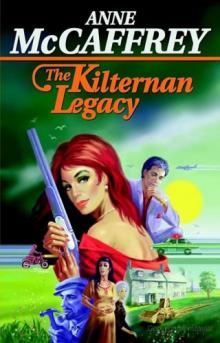 The Kilternan Legacy
The Kilternan Legacy Decision at Doona
Decision at Doona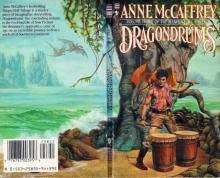 Dragondrums (dragon riders of pern)
Dragondrums (dragon riders of pern)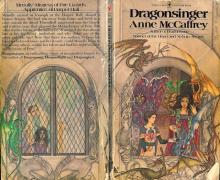 Dragonsinger (dragon riders of pern)
Dragonsinger (dragon riders of pern)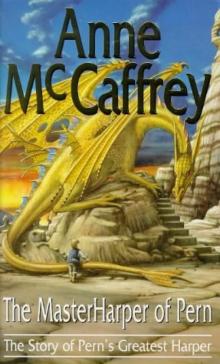 The Master Harper of Pern
The Master Harper of Pern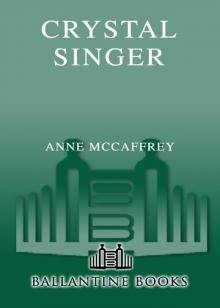 Crystal Singer
Crystal Singer Acorna’s People
Acorna’s People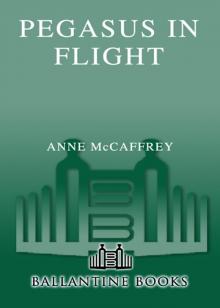 Pegasus in Flight
Pegasus in Flight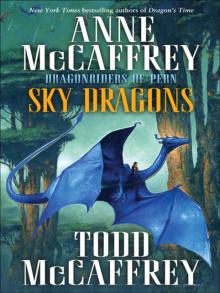 Sky Dragons Dragonriders of Pern
Sky Dragons Dragonriders of Pern Dragonriders of Pern 4 - Dragonsinger
Dragonriders of Pern 4 - Dragonsinger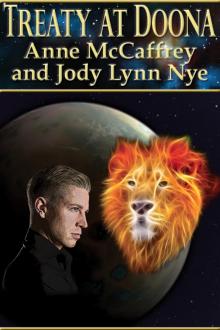 Treaty at Doona
Treaty at Doona Damia's Children
Damia's Children Stitch In Snow
Stitch In Snow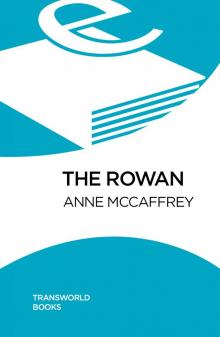 The Rowan
The Rowan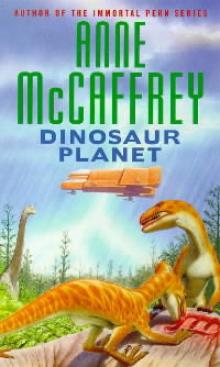 Dinosaur Planet
Dinosaur Planet The Year of the Lucy
The Year of the Lucy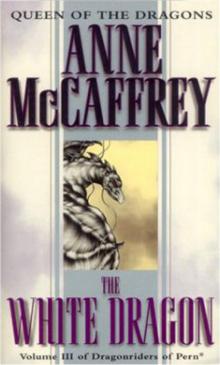 The White Dragon p-4
The White Dragon p-4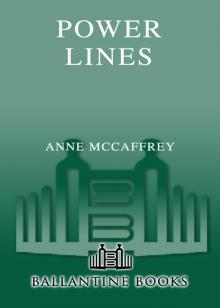 Power Lines
Power Lines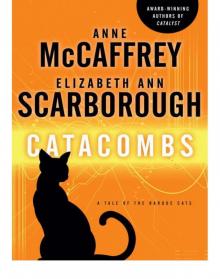 Catacombs
Catacombs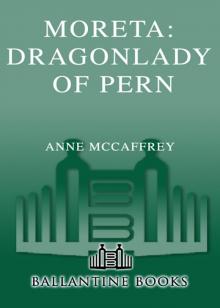 Moreta
Moreta Dragonsinger
Dragonsinger Crystal Line
Crystal Line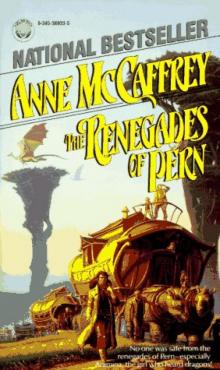 The Renegades of Pern
The Renegades of Pern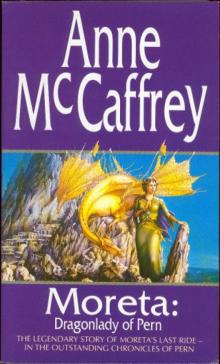 Moreta - Dragonlady of Pern p-8
Moreta - Dragonlady of Pern p-8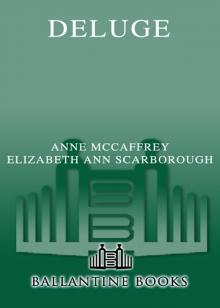 Deluge
Deluge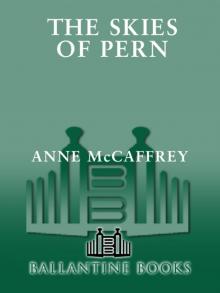 The Skies of Pern
The Skies of Pern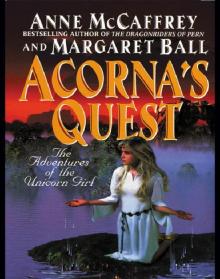 Acorna's Quest
Acorna's Quest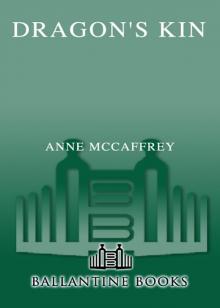 Dragon's Kin
Dragon's Kin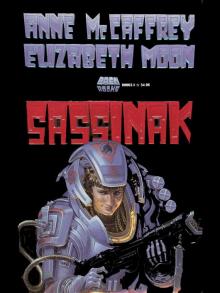 Sassinak
Sassinak![Crystal Universe - [Crystal Singer 03] - Crystal Line Read online](http://i1.bookreadfree.com/i1/03/31/crystal_universe_-_crystal_singer_03_-_crystal_line_preview.jpg) Crystal Universe - [Crystal Singer 03] - Crystal Line
Crystal Universe - [Crystal Singer 03] - Crystal Line Freedom's Landing
Freedom's Landing Acorna’s Quest
Acorna’s Quest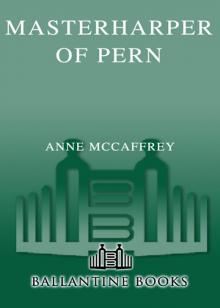 Masterharper of Pern
Masterharper of Pern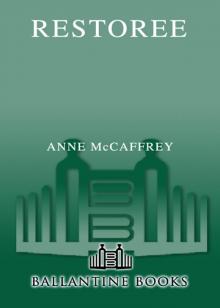 Restoree
Restoree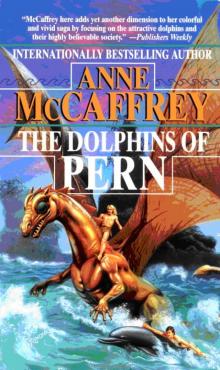 Dolphins of Pern
Dolphins of Pern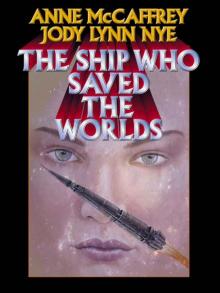 The Ship Who Saved the Worlds
The Ship Who Saved the Worlds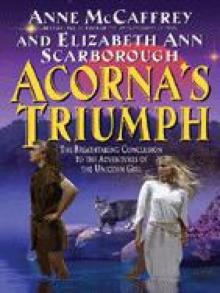 Acorna's Triumph
Acorna's Triumph Acorna's Rebels
Acorna's Rebels![[Acorna 08] - First Warning: Acorna's Children (with Elizabeth Ann Scarborough) Read online](http://i1.bookreadfree.com/i1/04/06/acorna_08_-_first_warning_acornas_children_with_elizabeth_ann_scarborough_preview.jpg) [Acorna 08] - First Warning: Acorna's Children (with Elizabeth Ann Scarborough)
[Acorna 08] - First Warning: Acorna's Children (with Elizabeth Ann Scarborough)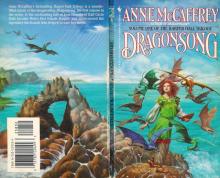 Dragonsong (dragon riders of pern)
Dragonsong (dragon riders of pern) Dragonriders of Pern 6 - Dragondrums
Dragonriders of Pern 6 - Dragondrums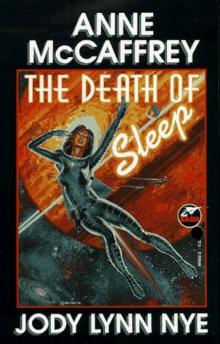 The Death of Sleep
The Death of Sleep Crisis On Doona
Crisis On Doona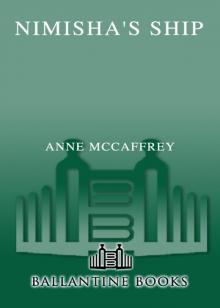 Nimisha's Ship
Nimisha's Ship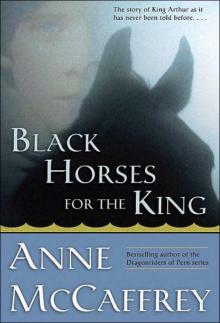 Black Horses for the King
Black Horses for the King Changelings
Changelings Freedom's Choice
Freedom's Choice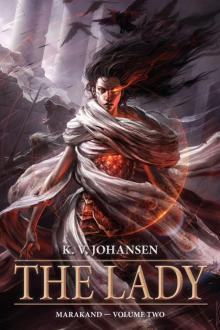 The Lady
The Lady The Coelura
The Coelura Catalyst
Catalyst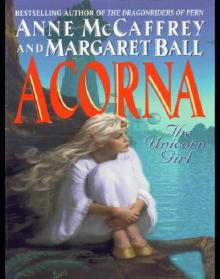 The Unicorn Girl
The Unicorn Girl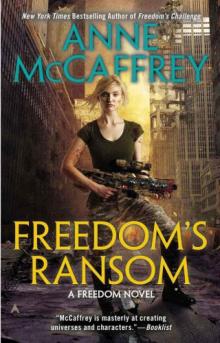 Freedom's Ransom
Freedom's Ransom Nerilka's Story
Nerilka's Story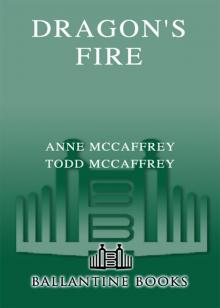 Dragon's Fire
Dragon's Fire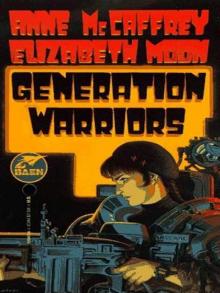 Generation Warriors
Generation Warriors Lyon's Pride
Lyon's Pride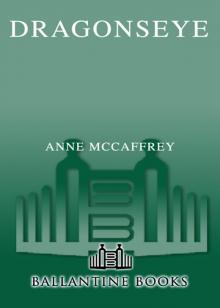 Dragonseye
Dragonseye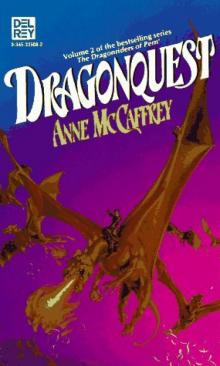 Dragon Quest
Dragon Quest Dragondrums
Dragondrums Dragonsong
Dragonsong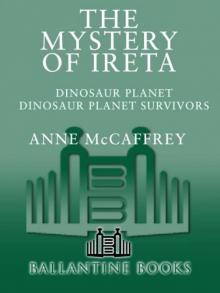 The Mystery of Ireta
The Mystery of Ireta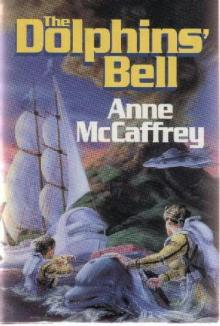 Dolphins' Bell
Dolphins' Bell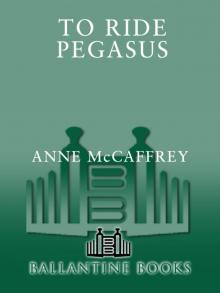 To Ride Pegasus
To Ride Pegasus Power Play
Power Play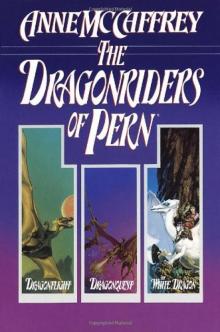 The Dragonriders of Pern
The Dragonriders of Pern An Exchange of Gifts
An Exchange of Gifts The Ship Who Sang
The Ship Who Sang Sky Dragons: Dragonriders of Pern
Sky Dragons: Dragonriders of Pern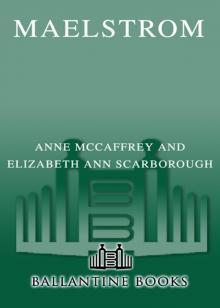 Maelstrom
Maelstrom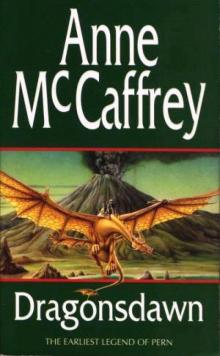 Dragons Dawn
Dragons Dawn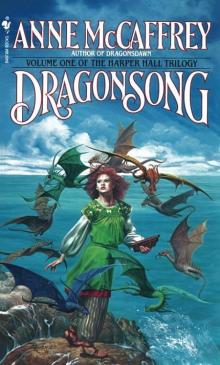 Dragon Song
Dragon Song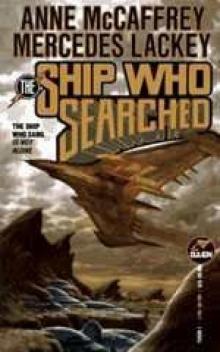 The Ship Who Searched b-3
The Ship Who Searched b-3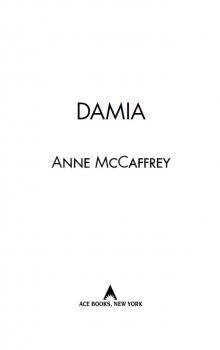 Damia
Damia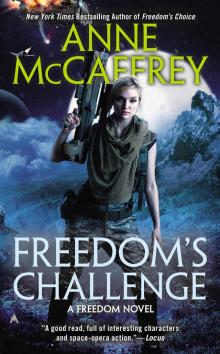 Freedom's Challenge
Freedom's Challenge